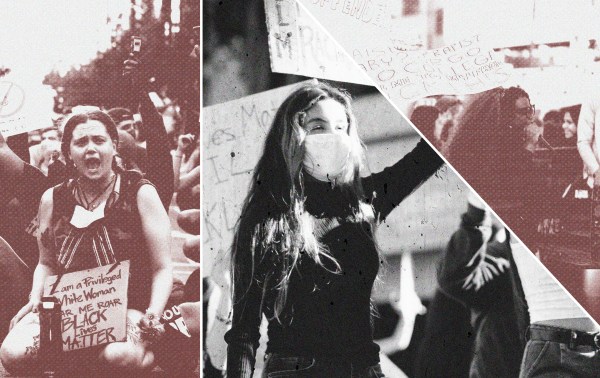Arizona. A state famous for saguaro cactuses, temperatures so hot that planes can’t take off, and election fraud accusations.
No part of Arizona has faced more of those allegations than Maricopa County, a county in the middle of the state containing both Phoenix and Mesa, as well as two-thirds of Arizona’s total population. In 2020, Maricopa was the epicenter of claims about the presidential election being stolen, and following this year’s midterm elections, Maricopa is still making national headlines.
Arizona had a number of high-profile races in 2022, including a very close contest for governor between former Secretary of State Katie Hobbs and former news anchor Kari Lake.
The elections put Maricopa County in the spotlight in particular. Before the election had even happened, Lake was accusing both the state and the county of trying to steal it from her as she claimed they did to Donald Trump in 2020.
“You haven’t seen me when they try to steal something,” Lake told supporters at a campaign event over the summer. “I’m going to go supernova radioactive….There’s going to be hell to pay if they try it. And we’re working right now—we’re already detecting some fraud. We’re going to have to win by a mile to eke out a one-inch win.”
All of the claims Kari Lake circulated about the 2020 election in Maricopa County were contested by the board of supervisors there, which could often point to specific conclusions from audits confirming the accuracy of the election results. Anticipating more allegations in 2022, though, the county opted for offense over defense: It decided to show citizens how every step of the election process worked.
On the Maricopa County website, the election board provided this 24-hour live feed with two views of the vault used to store ballots, live video of ballot drop boxes in Mesa and Phoenix, six views of the early voting facility, and nine views of the places where votes were tabulated. You can see that election workers left the wiring of the tabulator machines exposed, so people could see what was connected to what.
Officials used the Maricopa County elections Twitter account to post nonstop updates in both English and Spanish explaining where to vote, how and where each vote would be counted, and the security features of the machines used to do the counting.
Stephen Richer, the Maricopa County recorder, told The Dispatch that the election board has tried to be as transparent as possible throughout the whole process.
“We know that we’ve been at the epicenter of election conspiracies, election questions,” Richer explained. “So we’ve tried to produce as much information, invite as many people in for tours, write as many papers, do as many videos, hold as many press conferences [as possible]. [Maricopa Elections Chairman Bill Gates] and I did weekly press conferences…to talk about the various different aspects and things under our statutory control relating to the election.”
Stephen Richer is an elected Republican, but he has stood up to Republicans’ election fraud claims in the past. After Trump released a statement in May 2021 saying the entire Maricopa County database was “DELETED” (all caps), Richer shared on Twitter that the claim was false and he was, in fact, looking at the database on his screen at the time.
That followed months of baseless election fraud claims relating to 2020. The night after the 2020 election, protesters disrupted ballot counting at the recording office in downtown Phoenix, accusing officials of not counting enough ballots at the same time that Trump supporters in other states were protesting the opposite, trying to persuade their election officials to stop the count.
Even after Arizona’s election results were confirmed and state officials publicly certified the results, the election drama continued: A physical hand recount of 47,000 ballots found no discrepancies. The Arizona Senate sent subpoenas to Maricopa County for all ballots cast in the election. An audit confirmed that voting machines worked properly and were not connected to the internet. The Arizona Senate commissioned yet another audit run by Cyber Ninjas, a Florida company with no previous election review experience and whose CEO had publicly backed Trump’s election fraud claims. Cyber Ninjas fought in court to keep the entire audit process secret, then sent all Maricopa voting data to a “Montana lab” that was actually just a log cabin owned by the company’s CEO. After all that, Cyber Ninjas ultimately confirmed that Joe Biden won Maricopa County by more votes than the official total had even been before.
In addition to all that—all in Richer’s first year on the job—he also had to research the methods of election fraud he was accused of perpetrating, things like fractional voting—in which conspiracy theorists say each Biden ballot was counted as slightly more than one vote.
It all led to Maricopa County introducing the spate of transparency initiatives this cycle, many of which Richer helped implement.
That’s not to say the 2022 election went perfectly. At least 70 of the 223 polling locations in Maricopa experienced problems with their ballot printers this cycle, where marks printed on the ballots were too faint for tabulating machines to read. Any voters affected by the printer issues had the option to leave their ballots in what was called box 3, a locked compartment attached to each tabulating machine that would be counted in downtown Phoenix later.
Yet, even as Maricopa County officials were hosting a live press conference to tell people what was going on and make clear that all ballots would be counted, others were sharing a different message online.
In a video posted to social media, former president Trump implied sinister motivations for midterm election issues—specifically mentioning Maricopa County by name.
“They say the machines aren’t working, that they’re running out of paper in different locations,” Trump said. “There’s a lot of bad things going on. Stay on-line. Do not leave….They want to delay you out of voting, and you cannot let them delay you out of voting. So to the people of Arizona in particular…stay on-line – don’t leave.”
With Trump telling people to “stay on-line” and other MAGA personalities telling voters not to leave polling places without their ballot being read by a local tabulator—something which election officials made clear was not necessary—voting lines got incredibly long at certain polling locations, with some people claiming they waited several hours to cast their vote. In the afternoon on election day, Lake’s team filed a lawsuit to keep polls open past their normal closing time, though an Arizona judge denied the request.
The fact that it was Lake’s team filing this lawsuit, however, reflects changing Arizona voter behaviors. Lake’s main argument is that these malfunctioning printers effectively disenfranchised voters on Election Day, but historically it’s been Democrats who claim voters have been disenfranchised.
“In times past, you would have seen that filed by Democrats,” Richer explained. “Republicans in Arizona were the early voters from 1992 through 2018. And then that behavior changed significantly in 2020, and Republicans dominated election day in 2020, and they’ve dominated election day in 2022 as well—both in the primary and in the general election.”
As of last week, all news outlets declared Lake’s opponent—Katie Hobbs—to be the winner of Arizona’s gubernatorial election. But, unsurprisingly, Lake has refused to concede.
“The people of Arizona are fit to be tied,” Lake told Steve Bannon in an episode of his War Room podcast. “Another election run by a bunch of clowns, and we’re not going to take it anymore….Maricopa County has screwed us over once again.”
Lake has now filed another lawsuit against Maricopa’s election officials, asking for names and contact information for voters at polling sites where ballot printers malfunctioned. “Because of the printer/tabulator problems, the polling locations were chaotic, voters were frustrated, and voters had to endure long lines,” Lake claims in her suit. “These public records are vital to the integrity of the election process and necessary to show, ahead of canvassing, that every legal ballot was properly counted.”
The language of Kari Lake’s suit is much more specific and technical than many of the accusations she has leveled against Arizona’s elections in the past, a fact which reflects the persistent discrepancy between public fraud claims and specific legal suits. The fact that Kari Lake is not alleging ballot box stuffing or database deleting may also be a backhanded credit to Maricopa’s raft of transparency initiatives.
For now, however, that hasn’t stopped her supporters making threats against Arizona’s election officials, which got so intense at one point that the Maricopa County Supervisor had to go into hiding.
Election officials like Richer say there’s probably more Arizona can do to improve elections in the state. But that’ll be a conversation for Arizona lawmakers.
“I think that Arizona probably needs to have a public policy conversation about whether it wants to shift on the compendium from convenience to speed of tabulation at all,” Richer explained. “[Arizona can decide] if it wants to move something closer to a Florida system where you’re giving up some convenience factor of being able to drop off your early ballot on election day, but then you’d be getting a higher percentage of the results within the first 24 hours. That’s the legislative process and I think that could be a fruitful conversation.”




Please note that we at The Dispatch hold ourselves, our work, and our commenters to a higher standard than other places on the internet. We welcome comments that foster genuine debate or discussion—including comments critical of us or our work—but responses that include ad hominem attacks on fellow Dispatch members or are intended to stoke fear and anger may be moderated.
With your membership, you only have the ability to comment on The Morning Dispatch articles. Consider upgrading to join the conversation everywhere.